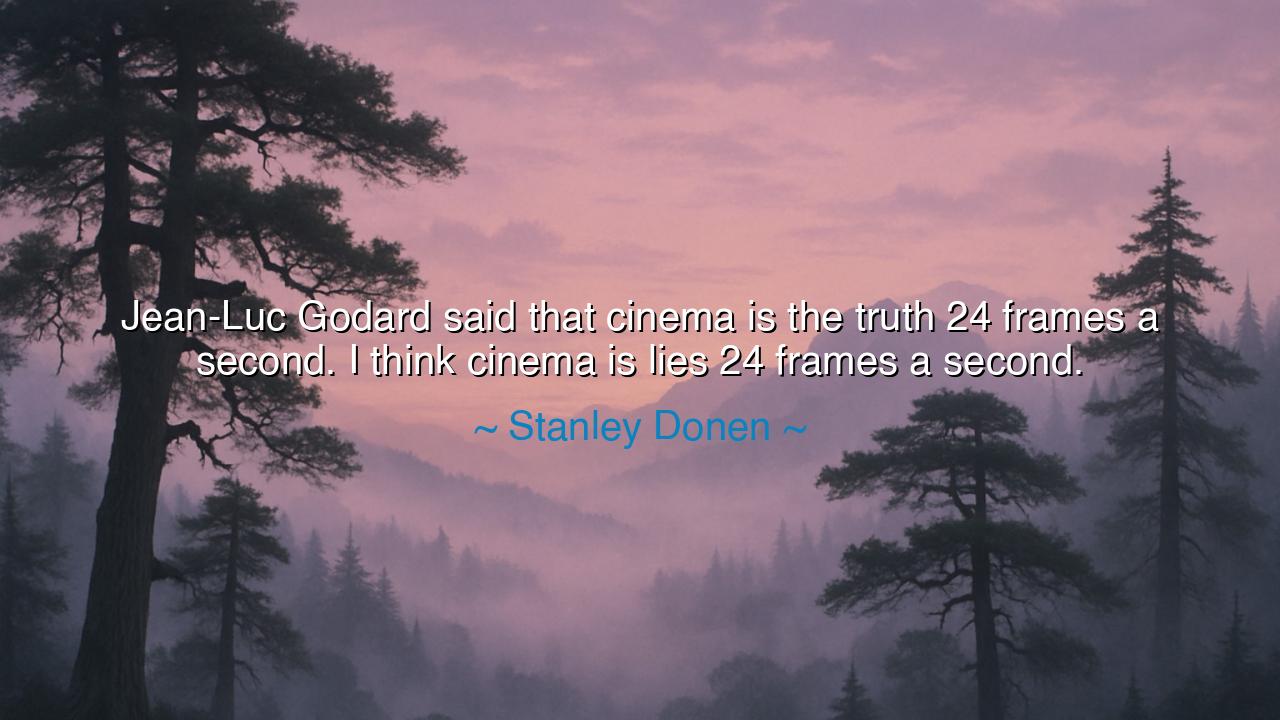
Jean-Luc Godard said that cinema is the truth 24 frames a
Jean-Luc Godard said that cinema is the truth 24 frames a second. I think cinema is lies 24 frames a second.






Stanley Donen, master of Hollywood musicals and craftsman of cinematic dreams, once declared with playful wisdom: “Jean-Luc Godard said that cinema is the truth 24 frames a second. I think cinema is lies 24 frames a second.” In these words lies the paradox of art itself. For while cinema moves us, teaches us, even awakens us, it does so not by presenting reality as it is, but by weaving illusion. The flickering images upon the screen are shadows, fabrications, carefully composed lies—and yet through these lies, audiences discover truths that life itself often hides.
The origin of this saying rests in a conversation across cultures and visions of film. Godard, the French revolutionary of cinema, saw the medium as a vessel of raw reality, a way of capturing existence unvarnished: “the truth 24 frames a second.” Donen, born of Hollywood’s golden age, knew differently. He understood that cinema’s power lay in artifice. Painted sets, choreographed da






PCHoang Phuong Chi
Stanley Donen’s take on cinema being lies really resonates in the context of how films portray emotions, characters, and situations. While Godard sees cinema as truth, Donen is reminding us that the medium itself is inherently manipulative. I’m curious—does this make cinema less impactful, or does it make us question what we consider as ‘truth’ in real life? What do you think: can something be truthful while also being a lie?
TMPhuong 38_Nguyen Tran Minh
I see where Donen is coming from. Cinema often presents a crafted version of reality—perfectly staged, edited, and designed to evoke specific responses. But are these ‘lies’ harmful, or do they help us understand truth in ways that literal representations cannot? Could it be that cinema, by lying to us, reveals deeper, emotional truths that are otherwise difficult to express? It’s a thought-provoking take on the power of film.
NNnhi nguyen
Donen’s quote got me thinking about how cinema is often perceived as a mirror to reality. But if it’s ‘lies’ 24 frames per second, what does that say about the storytelling in movies? Are films an escape from reality, or do they make us believe in something that isn’t true? It’s interesting to consider whether the illusions in film are what give them their power to captivate audiences.
HPAnh Hoang Phan
Stanley Donen’s perspective on cinema as lies 24 frames per second really challenges the romanticized notion of film as a reflection of truth. Is Donen suggesting that the very process of filmmaking, which edits and manipulates reality, makes cinema inherently false? If cinema is constantly constructed, can it ever truly be considered truthful? How much of what we see on screen is shaped by the filmmakers' intentions versus real life?
RVRoxana Vanx
I like the contrast between Godard’s statement and Donen’s response. Godard sees cinema as a form of truth, while Donen acknowledges that cinema, by its very nature, is deceptive. Is it possible that both are true? Cinema can convey powerful truths through fiction and exaggeration. What if the lies in cinema are what allow us to confront deeper truths about ourselves and the world?